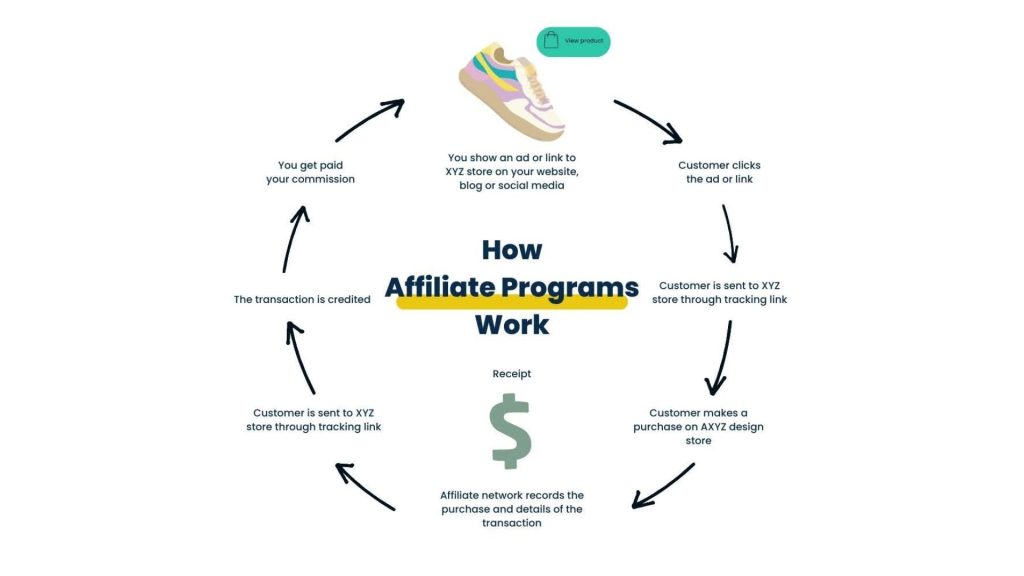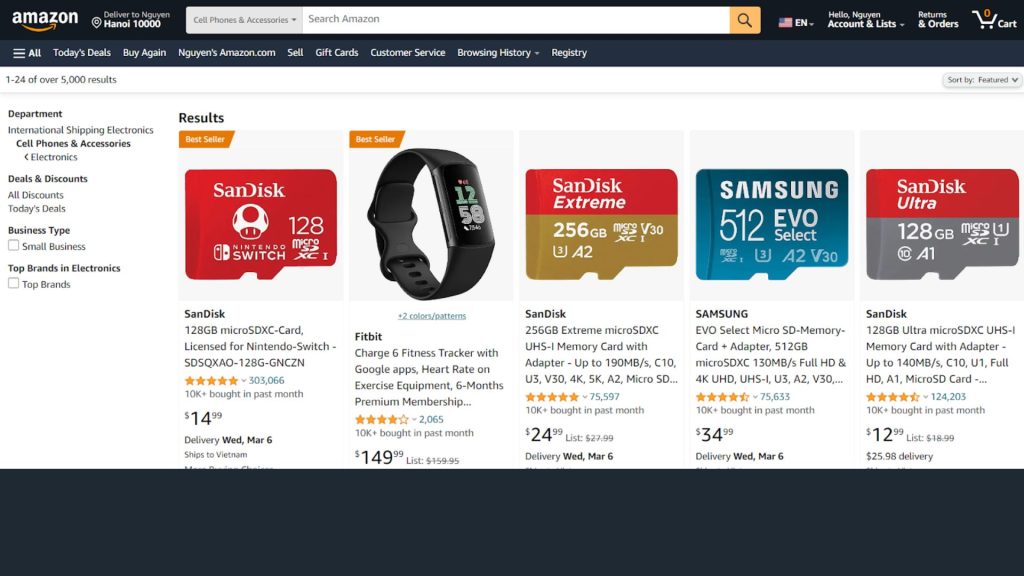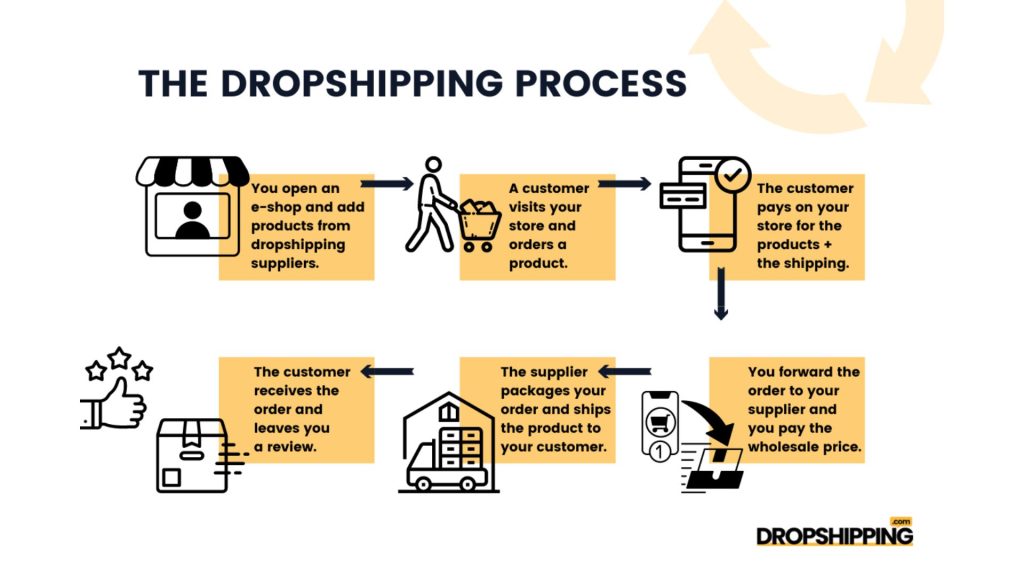Two of the most popular and effective marketing models are eCommerce and affiliate marketing. This is because they both have fairly low entry barriers and a high monetization potential.
Need more proof?
eCommerce sales are predicted to reach $8.1 trillion in 2026, which is a 56% growth over the next 3 years. Whereas in 2022, the global affiliate marketing industry was reported to be worth $8.2 billion.
In case you are considering affiliate marketing vs eCommerce for your online strategy, this article is for you. Here, we compare and analyze these online business models to help you decide the best.
Affiliate Marketing Vs eCommerce: How Are They Different?
| Affiliate Marketing | eCommerce | |
| Goals | Promote products or services on behalf of merchants via multiple channels | Sells products or services to customers via an online store |
| Control power | Only with their marketing efforts and strategies | Full responsibility |
| Starting cost | Almost none | Cheaper than traditional eCom due to no physical store |
| Profit gains | Depends on the merchants’ commission rate | Depends on their long-term plans and vision |
| Time required | Quick to become a side hustle | May take years to achieve scalable growth |
Goals
Affiliate marketing vs eCommerce work similarly to make a sale of products to prospective customers. But in significantly different approaches.
eCommerce business owners sell their products or services directly via an online store on various eCommerce platforms. Their job is to drive potential buyers through a sales funnel to the shopping cart and spend money.
Affiliate marketers use affiliate links to promote these products or services via personal online channels (e.g., social media, blogs, etc.). Every time someone clicks on those URLs and makes a purchase, they get paid a sale commission from the brand.
Control power
An eCommerce merchant either sells goods under their own brand name. Or become a vendor to stock other brands’ products.
These entrepreneurs are fully responsible for running and monitoring their business. This includes revenue streams, product storage, shipping costs, and customer service.
They also recruit affiliate partners to advertise these items to a broader audience.
On the other hand, publishers are limited to controlling only their affiliate marketing campaigns. Not the product quality or customer experience.
They can manage the traffic sources, user engagement, conversion rates, etc., to analyze and optimize marketing efforts.
Starting cost
In terms of initial expenses, affiliate marketing is highly attractive with low overhead investment. It is not exaggerated to claim that anyone can start affiliate marketing with some basic skills and a laptop.
At its core, a publisher’s work is to refer other brands’ products to their target audience using free platforms. Unless they want to invest in paid ads, this model has almost no upfront costs.
But that does not mean eCommerce brands must spend a lot of money to initiate their businesses.
Despite selling their own goods, these merchants needn’t stock and deliver these themselves. They can work with dropshipping suppliers to handle the inventory and fulfillment.
Thus, a dropshipping-based business is as budget-friendly as affiliate marketing.
Profit gains
How much an affiliate marketer makes largely depends on the commission rate. What they receive is a revenue share, either in a fixed amount of money ($30 per sale) or a percentage of the sale (15%).
That is why it is easy to start, but most publishers will make it a passive income rather than a full-time job.
On the contrary, excluding several side costs from the beginning, eCommerce merchants earn much higher final profits.
They get to determine their own profit margins. Especially when most eCommerce businesses can yield approximately 40% of gross profit margin.
Time required
Last is the required time investment between affiliate marketing vs eCommerce.
Beginning affiliate marketing is as easy as a few clicks. You join affiliate programs and include referral URLs in your promotional content. Thus, it does not take much time for the advertisement to attract leads and start converting.
An eCommerce store, on the other hand, requires your full-time commitment to invest a lot of time and effort. It may take several years for the merchant to gain scalable profits.
They will also need to work on long-term business plans and keep close track of how the business performs over time.
What is Affiliate Marketing?
Affiliate marketing is performance-based digital marketing model. Merchants reward marketers for each successful sale made via their efforts.
The business model has been gaining online popularity for being straightforward to start with. It allows individuals to earn commissions from products they recommend.
This explains why the global affiliate marketing industry is forecasted to reach a 9.89% compound annual growth rate (CAGR). It can lead to a roughly $27.8 billion market size by 2027.
In affiliate marketing, brands collaborate with affiliates to promote products on their behalf. The affiliate gains commissions after someone clicks on their links and purchases on the merchant’s website.

A successful affiliate program depends on the affiliates’ quality and how well they can market the assigned products. These partners must be knowledgeable about the goods they promote. Along with an understanding of how to effectively advertise them online.
Often, you will find affiliate marketing efforts on website blogs and social media channels. Publishers include affiliate links in their blog content or mention special offers on their Facebook. All to drive potential customers to the brand’s homepage and make sales.
What is eCommerce?
eCommerce marketing drives customer awareness and action toward an online store that sells its own products or services. This model follows an entire customer journey, from attracting leads to the shop, urging them to become buyers, and retaining them afterward.
Merchants of various niches come to run their stores on worldwide eCommerce giants like Amazon, eBay, Walmart, and AliExpress. When operating an eCommerce business, the owner must be capable of covering all essential aspects.

An eCommerce merchant can apply various tactics to promote their business, such as:
- Search engine optimization (SEO): Add relevant keywords to blog articles for them to rank higher in Google search results.
- Content marketing: Produce educational and/or valuable content on various channels (websites, social media, blog publishing platforms, etc.).
- Email marketing: Send email sequences for product pitching and customer service after sales.
- Social media marketing: Use bios, posts, groups, and fanpages on famous social media platforms like Facebook, Instagram, LinkedIn, etc.
- Paid ads: Pay for Google and other social channels to boost product visibility and reach a more interested audience.
Affiliate marketers can also utilize these approaches for content monetization. But it does not come with consequences if they fail.
While eCommerce owners must be careful in spending money and effort in any part of the process. This helps them avoid financial risks.
Similarities of Affiliate Marketing Vs eCommerce?
Despite having obvious differences, affiliate marketing vs eCommerce still share a few features in common.
Easy to start
Starting online businesses has never been easier in this digital era. Generally speaking, both eCommerce and affiliate marketing have a much lower entry barrier than a traditional brick-and-mortar model.
What incentivizes people to try these marketing types is definitely the humble, almost no startup costs. Whether you promote online services or physical products.
In addition, both affiliate marketing and eCommerce require fewer skills and knowledge than setting up a physical storefront. In most cases, you only need to build a captivating blog or a well-functioning website to attract potential buyers.
Either way, it is possible to turn your interest into a stable source of income. Especially with affiliate marketing.
Global potential customers
The worldwide online customer base has seen astonishing growth in recent years. And the number keeps increasing since everyone is now addicted to shopping on eCommerce platforms rather than in-store.
Furthermore, there will potentially be 12-24 million global eCommerce stores in 2024. Isn’t it the perfect timing for you to start an eCommerce or affiliate marketing business?
These 2 models bring consumers the exact convenience they need. Browse products at the convenience of their home and have the package shipped to their doors.
So, make it your advantage as a merchant wanting to experience the potential of the virtual space.
Automation & optimization opportunities
Although running an eCommerce or affiliate marketing business is undemanding, succeeding in this industry is a different story. The key to winning in these industries involves continual tracking, analyzing, and improving.
Luckily, both methods come with helpful tools to handle all these tasks automatically. When collecting valuable data such as monthly revenue, user engagement, and return on investment (ROI), the tools offer insightful reports and even suggest ways for improvement.
As a result, both affiliate marketers and eCommerce merchants can make data-driven decisions to optimize their performance. No need to second-guess if your marketing changes bring better results than the last time.
Affiliate Marketing Vs eCommerce: Which One is Suitable for You?
- Skills and interests:
In terms of interests, an affiliate marketer has the right to join various programs and promote different niches at once. They are not tied to one specific category, either to focus on one or advertise many.
For example, a lifestyle influencer can recommend products from diverse brands. They can also start with zero skills and learn to develop necessary ones on the go.
A merchant has to research niches thoughtfully from the beginning and select only one for their store. Moreover, they need specific skill sets to operate the business and earn profits.
- Resources:
Most people assume that having an online shop requires the merchant to stock physical products and deliver them. Which is totally not accurate.
A lot of eCommerce brand owners now partner with dropshipping suppliers to reduce extra costs and work. They will overlook the packaging and delivery process and only be directly involved in payment issues, returns and refunds, and customer support.

And needless to say what you need to prepare for affiliate marketing. Literally nothing but practical marketing tactics and a laptop to dive in.
- Desired level of control:
Whether you should opt for affiliate marketing or eCommerce largely depends on the control level you want.
Regarding eCommerce, merchants must manage an entire online store. The necessary amount of work includes multiple operational tasks listed above. So, it requires them to take full responsibility for the business operation.
In contrast, an affiliate marketer can easily see their job as a side income. They only keep track of their own performance, which relates to the overall monthly commission.
More time and effort, more sales, more money. No need to be concerned about customer service or product shipment.
- Risk tolerance:
eCommerce brand owners are in complete control of their businesses. And so is the risk associated with it. An online shop can bring you profits and also business-related issues, especially financial.
Not everyone is prepared for the fall.
However, one of the most noticeable advantages of affiliate marketing is low risks. In most cases, there is no overhead cost to join an affiliate program/network. And publishers earn money from successful sales.
Thus, it is your willingness to tolerate risks at which level.
Combining Affiliate Marketing and eCommerce
Being an online business merchant, you might consider e-Commerce and affiliate marketing working in harmony.
How exactly can you benefit from affiliate marketing in eCommerce?
Improve reach and exposure
Affiliate marketing enables businesses to reach their partners’ audiences. This helps you tap into a broader customer base that might be unapproachable with eCommerce alone.
Affiliates use their own influence and channels. So, merchants can rely on that to boost brand exposure. It also helps attract new customers.
In addition, the credibility and reputation of your partnered eCommerce platforms matter. Your affiliation with them can increase your brand awareness as shoppers trust these platforms.
Budget-friendly marketing
The performance-based nature of affiliate marketing is a winning factor.
You only need to pay affiliates after they successfully drive desirable actions. Like making sales and capturing leads. Which is using your money wisely since you pay for actual results.
Therefore, it gives you better control over your marketing expenses and enables a cost-effective strategy.
Various promotional channels
Incorporating affiliate marketing means eCommerce brands can advertise through their affiliates. They use creative approaches to promote products on social media, blogs, or websites to connect with their followers.
Consequently, it makes your business more recognizable to potential customers, allowing them to engage in diverse ways.

As people interact with your content, leave reviews, or ask questions, it fosters community. Moreover, it encourages customer loyalty for word-of-mouth referrals and repeat purchases.
FAQs
Q: Is e-commerce affiliate marketing?
The main difference between affiliate marketing vs eCommerce is:
An eCom business sells its products or services directly to consumers via an online shop. While affiliate marketers promote goods from different brands and redirect buyers to these merchants instead.
Q: Are e-commerce vs Affiliate Marketing still worth it in 2024?
There is a lot of potential to start eCommerce and affiliate marketing in 2024.
If you can sell your own products via an online store, it increases the price tag and may help you earn 3-4x the yearly revenue.
And approximately 20% of affiliate marketers can make at least $1M a year.
Q: Is it true that e-commerce is better than affiliate marketing?
It is certain that eCommerce is more profitable in the long run. However, it requires the merchant to invest much resources, time, and effort to begin.
In contrast, affiliate marketing is quicker and easier to make money online without upfront costs and business-related risks.
Q: Is it possible to combine both eCommerce and affiliate marketing in my business strategy?
The most brilliant marketing strategy has to combine affiliate marketing and eCommerce.
A merchant should learn how to utilize both models. They help increase sales and reach more audiences with a humble budget. It is an effective method to promote your products and improve brand awareness.
Conclusion
The type of business you should opt for depends on what you want to yield from it.
Whether it is affiliate marketing vs eCommerce, they both have benefits and shortcomings that require thoughtful consideration.
A traditional merchant wanting to build their own brand with full control should go for eCommerce. While affiliate marketers can develop their personal platforms without worrying about business problems.
Incorporating affiliate marketing into your eCommerce store is another great idea to enhance your strategy. In the end, it is all about how much time, money, and effort you are willing to invest in which model.







